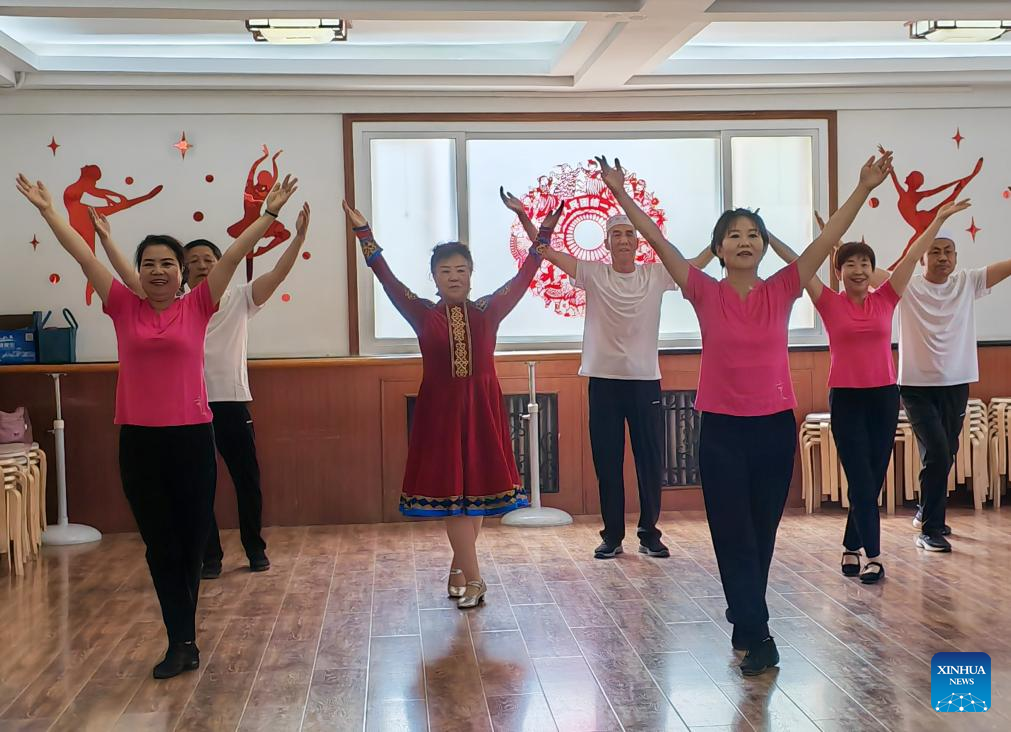


Residents rehearse for dancing at a community in Yinchuan, northwest China's Ningxia Hui Autonomous Region, June 17, 2024. (Xinhua/Liu Hai)
YINCHUAN, June 21 (Xinhua) -- Sharing homemade festival snacks, forming voluntary service teams and providing services to residents in need have become common practices in a multi-ethnic residential community in northwest China, making the community a paragon of interactions and integration among different ethnic groups.
In the community located in the city of Yinchuan, capital of Ningxia Hui Autonomous Region, Su Fang, a member of the Hui ethnic group, brings traditional snacks such as fried dough twists to share with her neighbor Wang Yonghua, who belongs to the Han ethnic group.
Su's hometown is located in Ningxia's Tongxin County, over 200 km from Yinchuan, which is among the main counties primarily inhabited by people from the Hui ethnic group in Ningxia. The snacks were made by Su's 80-year-old mother when she returned home to celebrate the Corban Festival with her family.
"We have a close relationship with our neighbors," said Su. "During this year's Dragon Boat Festival, Wang's wife brought me homemade Zongzi (sticky rice dumplings). Whether it's the Mid-Autumn Festival or the Corban Festival, we always greet each other and share delicacies. We have already become family."
Su added that, due to her poor heart condition, her neighbors often take care of her.
The community, where Su resides, has 19 residential areas under its jurisdiction and over 18,000 residents, of whom 38 percent are from ethnic minority groups including Hui, Manchu and Mongolian.
Zhao Naixiang, Party secretary of the community and director of the community's neighborhood committee, said that the community makes use of traditional Chinese cultural festivals as a vehicle for a range of activities to enrich the cultural life of the residents and enhance mutual understanding among people of all ethnic groups.
Nowadays, the relationship between neighbors has extended beyond simply celebrating festivals and sharing food within the community. It has become a platform for emotional exchange and integration among different ethnic groups.
According to Zhao, the community has utilized WeChat groups to establish an on-demand network platform to improve its services and management.
"When children lose their smartwatches or when someone has to work overtime and there is no one left to take care of their child, all they need to do is to send a message in a WeChat group and the community staff will respond promptly," said Zhao.
Mutual assistance among neighbors has become a customary practice in the multi-ethnic community.
Li Yuzhong, 75, is a community resident who has been a Party member for 43 years. Since retiring from a company in 2009, he has participated in the voluntary community service work and established dance teams to enrich the cultural life of the residents.
During a survey conducted by the community's neighborhood committee, he learned that some residents afflicted by cancer stayed at home for a long time and were unwilling to go out, leading to feelings of depression and loneliness. "I thought that I should do something for them," he said.
In January 2017, with the support and guidance of the community, Li and resident Huang Sheng established a mutual aid group, which is named "Baobao," meaning hugging. "The name of the group means huddling together for warmth. The cancer patients should encourage one another, maintain a healthy mentality and integrate better into society," he said.
According to Li, the group provides psychological counseling and emotional support to cancer patients and their families, and assists them in solving any difficulties they may encounter. It also organizes activities such as choir rehearsals and brisk walking, aiming to help them cultivate hobbies and encourage them to face life with an optimistic mentality.
Li Baoguo, a 69-year-old community resident from the Hui ethnic group, has not only received help from the group, but also lent a helping hand to others. He said that he was diagnosed with liver cancer eight years ago and faced the grim prognosis of possibly having less than half a year to live, a situation that threw him into despair. However, he has now made a good recovery and is a group member.
"We share our experience in fighting against cancer, and encourage and support one another within the group. Through participating in activities, I feel a change in my mindset, a reduction in mental stress, and a lightening of the burden on my family," said Li Baoguo.
Over the course of more than seven years, the number of volunteers in the group has grown from two to 16, while the number of individuals receiving care has increased from six to 30. The group has organized over 150 activities over the years.
Currently, the residential community boasts more than 800 registered volunteers and 13 voluntary service teams in fields including healthcare, legal aid and cultural services.
"Our common goal is to foster a sense of unity among different ethnic groups and make the community a big family where residents support and help one another," said Zhao.
点击右上角![]() 微信好友
微信好友
 朋友圈
朋友圈

请使用浏览器分享功能进行分享
